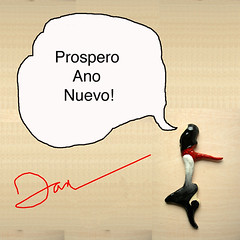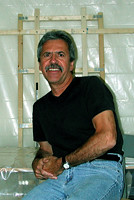Friday, December 30, 2005
I haven’t posted here for a while. I am still in the process of setting up a linked network combining my blogs with my art web site. I am using a blog page to archive selected essays and reviews of my exhibitions and work. The essays and reviews are being archived at Ramirez@Luz:Articles/Reviews My web site URL is: danramirez.net I hope you can find some time to visit.
Wednesday, December 28, 2005
Saturday, December 17, 2005
Ballet With a Silent Muse: In 6/8
I
Light
Without waver
Flame
Without tongue
Time
Fans a silence
Long ago
Sung
II
Dance
Upon tip-toe
To the still
Of your light
Stacotto;
Each step
A code
To the night
III
No place
Left for shadows
To emphasize
Space
The quiet
Of darkness
Has taken
Its place
IV
But the sheen
From the floor
Now dented
In rows
Lights the dark
To reveal
That nothing still
Shows
V
Then…
With a bow
Towards my pen
As you
Turn off the stage
Silence
Once more
Dances over
This page
VI
This liquid
As dark
As the space
Now defined
Hears no sound
From the steps
On this stage
Of my mind
Light
Without waver
Flame
Without tongue
Time
Fans a silence
Long ago
Sung
II
Dance
Upon tip-toe
To the still
Of your light
Stacotto;
Each step
A code
To the night
III
No place
Left for shadows
To emphasize
Space
The quiet
Of darkness
Has taken
Its place
IV
But the sheen
From the floor
Now dented
In rows
Lights the dark
To reveal
That nothing still
Shows
V
Then…
With a bow
Towards my pen
As you
Turn off the stage
Silence
Once more
Dances over
This page
VI
This liquid
As dark
As the space
Now defined
Hears no sound
From the steps
On this stage
Of my mind
Monday, December 12, 2005
Back to the Dance?
As I continue to build my website Ramirez@Luz I continue to read reviews and essays from the past so that I can post a few that will bring some context to the overall chronology and structure of my art. Last night as I was retyping one from 1982 entitled “The Dancer and the Dance: Philosophy and Accomplishment in the Work of Daniel Ramirez” (I hope to post this to my web site www.dramirez.net soon) I became very much aware as to what extent my art and I have changed over the years and to what degree remained consistent! The author, Robert Glauber (now deceased) in his attempt to comment on my approach to reality and illusion, began the article with an excerpt from “Among School Children” by W.B.Yeats:
O chestnut tree, great rooted blossomer,
Are you the leaf, the blossom or the bole?
O body swayed to music, O brightening glance,
How can we know the dancer from the dance?
As I was rereading the essay I realized how in our previous conversations on the topic of art and life and my decision to speak to the issue of alcoholism I focused on the importance of living life in the moment; not only for its significance toward recovery but for the importance of appreciating the gift of having been given the day.
As circumstances and fate would have it I have come across a poet whose work I would like to share with you. I find his poetry very much in accord with art and life in the way that I sometimes try to convey. His art is also very “minimalist” in style, an approach that causes me to feel a close kindredship. His name is Samuel Menashe. He has recently been cited as the winner of the “Neglected Masters Award.” This award is given by “The Poetry Foundation” and “is intended to draw fresh attention to a significant poet whose work deserves a wider readership, and in the process to expand awareness of the kinds of verse written today.” His background is described briefly by Stephen Spender in “The New York Review of Books” in 1971 as “…a poet of entirely Jewish consciousness, though on a scale almost miniscule. He is not one of the prophets, concerned with exodus, exile, and lamentation: but he is certainly witness to the sacredness of the nation in all circumstances in life and death. His poetry constantly reminds me of some kind of Biblical instrument – tabor or jubal – and the note it strikes is always positive and even joyous. His scale is, I repeat, very small, but he can compress an attitude to life that has an immense history into three lines.”
The particular poem that caught my attention (longer than most of his others) as to living in the moment (and I daresay there can be other interpretations than my sense of it) is the following:
Roads run forever
Under feet forever
Falling away
Yet, it may happen that you
Come to the same place again
Stay! You could not do
Anything more certain-
Here you can wait forever
And rejoice at your arrival
Have a great day!
O chestnut tree, great rooted blossomer,
Are you the leaf, the blossom or the bole?
O body swayed to music, O brightening glance,
How can we know the dancer from the dance?
As I was rereading the essay I realized how in our previous conversations on the topic of art and life and my decision to speak to the issue of alcoholism I focused on the importance of living life in the moment; not only for its significance toward recovery but for the importance of appreciating the gift of having been given the day.
As circumstances and fate would have it I have come across a poet whose work I would like to share with you. I find his poetry very much in accord with art and life in the way that I sometimes try to convey. His art is also very “minimalist” in style, an approach that causes me to feel a close kindredship. His name is Samuel Menashe. He has recently been cited as the winner of the “Neglected Masters Award.” This award is given by “The Poetry Foundation” and “is intended to draw fresh attention to a significant poet whose work deserves a wider readership, and in the process to expand awareness of the kinds of verse written today.” His background is described briefly by Stephen Spender in “The New York Review of Books” in 1971 as “…a poet of entirely Jewish consciousness, though on a scale almost miniscule. He is not one of the prophets, concerned with exodus, exile, and lamentation: but he is certainly witness to the sacredness of the nation in all circumstances in life and death. His poetry constantly reminds me of some kind of Biblical instrument – tabor or jubal – and the note it strikes is always positive and even joyous. His scale is, I repeat, very small, but he can compress an attitude to life that has an immense history into three lines.”
The particular poem that caught my attention (longer than most of his others) as to living in the moment (and I daresay there can be other interpretations than my sense of it) is the following:
Roads run forever
Under feet forever
Falling away
Yet, it may happen that you
Come to the same place again
Stay! You could not do
Anything more certain-
Here you can wait forever
And rejoice at your arrival
Have a great day!



